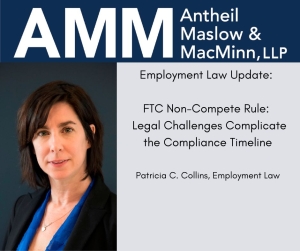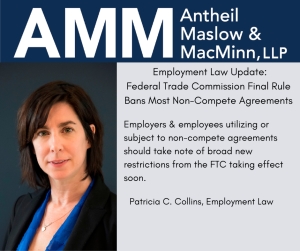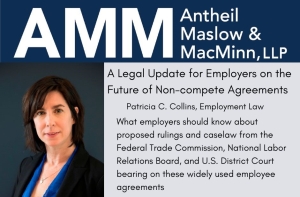FTC Non-Compete Rule: Legal Challenges Complicate the Compliance Timeline
Reprinted with permission from the June 8th edition of The Legal Intelligencer. (c) 2024 ALM Media Properties. Further duplication without permission is prohibited.
On April 23, 2023, the Federal Trade Commission (“FTC”) issued a final rule imposing a broad restrictions on non-competition agreements (“Final Rule”). The Final Rule requires employers to rescind existing non-compete agreements, and preempts conflicting state laws. The Final Rule is effective on September 4, 2024. In the meantime, there were three cases filed (one of which has been dismissed) that may result in a stay of implementation of the rule. This creates uncertainty for employers and employees in preparing for the effective date of the Final Rule. The Final Rule dramatically impacts both employers and employees. Employees subject to these agreements, and contemplating a move, may be waiting for September 4, 2024 to make decisions. Employers must prepare to determine to whom they will send rescission notices, and what steps they will take to ensure protection of trade secrets and customer relationships.
The Final Rule defines “non-compete clauses” as follows: any agreement that prevents a worker from, or penalizes a worker for, seeking or attempting to seek employment with any employer after the termination of their current employment. The Final Rule mandates that it is a prohibited unfair method of competition to enter into or “attempt to enter into” a non-compete clause with an employee, or to enforce an existing non-compete agreement, or to represent to an employee that they are subject to a non-compete without a good faith basis to believe they are.
The Federal Trade Commission's Final Rule Bans Most Non-Competes
On April 23, 2023, the Federal Trade Commission (“FTC”) issued a final rule imposing a broad restriction on non-competition agreements (“Final Rule”). The Final Rule requires employers to rescind existing non-compete agreements and would preempt conflicting state laws. The Final Rule is effective 120 days from its publication in the Final Register.
The Final Rule defines “non-compete clauses” as follows: any agreement that prevents a worker from, or penalizes a worker for, seeking or attempting to seek employment with any employer after the termination of their current employment.
The Final Rule mandates that it is a prohibited unfair method of competition to enter into or “attempt to enter into” a non-compete clause with an employee, or to enforce an existing non-compete agreement, or to represent to an employee that they are subject to a non-compete without a good faith basis to believe they are.
Accordingly, the Final Rule not only requires employers not to enter into or “attempt to enter into” employee non-compete agreements, it also requires employers to rescind their existing non-compete agreements, and then notify the current and former employees that the non-compete is rescinded within forty-five days of the rescission. The Final Rule provides a form for the notice of rescission. The obligation to rescind existing non-compete clauses does not apply to where a cause of action related to a non-compete clause accrued prior to the effective date.
The Federal Trade Commission's Campaign to Eliminate Non-Competes
Reprinted from the October 18th edition of The Legal Intelligencer. (c) 2023 ALM Media Properties. Further duplication without permission is prohibited.
On January 5, 2023, the Federal Trade Commission (“FTC”) issued a proposed final rule that would result in a ban of non-compete agreements, and would require employers to rescind existing non-compete agreements. The public comment period for the rule terminated on April 19, 2023, but the FTC has acted aggressively to ban non-competes in the meantime. The FTC has filed complaints against companies that use non-compete agreements, resulting in consent orders that accomplish the recission of hundreds of existing non-compete agreements. The United States Department of Labor, the National Labor Relations Board and even the courts have also taken steps to deter the use of non-compete agreements.
The Federal Trade Commission’s Proposed Ban On Non-Competes
Reprinted from the February 10th edition of The Legal Intelligencer. (c) 2022 ALM Media Properties. Further duplication without permission is prohibited.
On January 5, 2023, the Federal Trade Commission (“FTC”) proposed rules imposing a broad restriction on non-competition agreements (“Proposed Rule”). The Proposed Rule would require employers to rescind existing non-compete agreements, and would preempt conflicting state laws. The ban marks a dramatic change not only in the law, but in the relationship between employers and their key employees.
The Proposed Rule defines “non-compete clauses” as follows: any agreement that prevents a worker from seeking or attempting to seek employment with any employer; or, any agreement that is a de facto non-compete clause. A de facto noncompete clause has the “effect of prohibiting the worker from seeking or accepting employment.” The Proposed Rule provides examples of a de facto non-compete clause: a non-disclosure agreement drafted so broadly that it effectively precludes the employee from working in their chosen field; or a contractual term that requires the employee to pay the employer or a third party its training costs if employment terminates within a specified time period, but only where the payment is not reasonably related to the actual costs incurred by the employer.
The Proposed Rule mandates that it is a prohibited unfair method of competition to enter into or “attempt to enter into” a noncompete clause with an employee, or to maintain an existing non-compete agreement, or to represent to an employee that they are subject to a noncompete without a good faith basis to believe they are.























